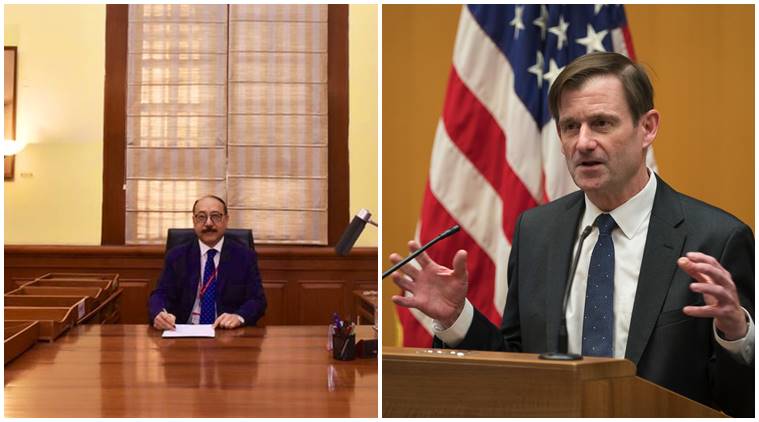 Foreign Secretary Harsh Vardhan Shringla (L) met with his American counterpart, Under Secretary of State (Political Affairs) David Hale, through a video call.
Foreign Secretary Harsh Vardhan Shringla (L) met with his American counterpart, Under Secretary of State (Political Affairs) David Hale, through a video call.
Amid the tension between India and China, Foreign Secretary Harsh Vardhan Shringla on Tuesday discussed “ongoing threats to the rules-based international order” with his US counterpart, Under Secretary of State (Political Affairs) David Hale, and “agreed to consult closely on all challenges and endeavour to support each other’s objectives”, the US State Department said.
The virtual meeting took place on Tuesday evening and comes about two weeks after US Secretary of State Michael R Pompeo made a quiet call to External Affairs Minister S Jaishankar after the June 15 clash between Indian and Chinese troops in Ladakh.
The Ministry of External Affairs (MEA) said in a statement that Shringla and Hale exchanged views on a “number of regional and global issues of shared interest” — a reference to the Ladakh standoff.
The US said the discussions included ongoing threats to the rules-based international order, bilateral and multilateral diplomatic cooperation, maritime security, and global response to the Covid-19 pandemic.
Both readouts referred to the Indo-Pacific issue, which has gained traction in the wake of assertive and aggressive Chinese military activity. The MEA stated, “They reaffirmed their commitment to work towards ensuring a free, open, inclusive, peaceful and prosperous Indo-Pacific.”
The US State Department said they “affirmed the US and Indian visions of a free and open Indo-Pacific region, where all countries can prosper, and agreed to work with other Indo-Pacific partners to bring these visions to reality”.
They reviewed the entire gamut of engagements under the India-US Comprehensive Global Strategic Partnership, including political, economic, commercial, regional and international cooperation, the MEA said.
The US said that they discussed US-India cooperation on a full range of international issues and developed concrete steps to strengthen the US-India Comprehensive Global Strategic Partnership established by their leaders.
India also said that they agreed on the need to deepen cooperation in the United Nations, especially during India’s membership of the UN Security Council for 2021-22.
However, on the issue of India’s planned defence purchases from Russia, a US State Department spokesperson said, in response to a media query in Washington DC, that they urged their partners to forgo transactions with Russia that risk triggering sanctions under the Countering America’s Adversaries Through Sanctions Act (CAATSA).
The spokesperson said: “We are aware of reports regarding India’s planned defense purchase from Russia. We cannot prejudge whether a specific transaction would result in sanctions. The Secretary of State has not made any determination regarding the significance of any transaction involving India. We urge all of our allies and partners to forgo transactions with Russia that risk triggering sanctions under CAATSA.”
In the backdrop of the Covid-19 pandemic, the two countries also agreed to further strengthen bilateral health partnership, including on pharmaceuticals and vaccine development.
While some disengagement is taking place between Indian and Chinese troops in Ladakh, White House Chief of Staff Mark Meadows on Tuesday said that US military “will continue to stand strong” in a conflict between India and China, or anywhere else. “The message is clear. We are not going to stand by and let China or anyone else take the reins in terms of being the most powerful, dominant force, whether it’s in that region or over here,” Meadows told Fox News.
In response to a question, he said, “Our military might stands strong and will continue to stand strong, whether it’s in relationship to a conflict between India and China or anywhere else.”
This is in line with the US thinking to counter the growing Chinese military threat perception. On June 26, Pompeo had said that the US is reviewing its global deployment of forces to ensure that it is “postured appropriately” to counter the growing Chinese military threat to countries such as India, Malaysia, Indonesia and the Philippines.
Meanwhile, Pompeo on Tuesday said the US is “certainly looking at” banning Chinese social media apps, including TikTok. “I don’t want to get out in front of the President (Donald Trump), but it’s something we’re looking at,” he told Fox News.